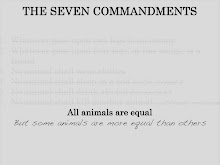

These two poodles represent the two sides of Pip that are shown during the novel. The dog to below represents his innocent side shown during the first part of the novel. This dog is much like the Pip in the sense that it's a character that is very down to earth, the type of personality we could relate to and sympathzise for. Although we may not sypathsize for this dog quite as much as we might for Pip because Pip is taken advantage of and this dog doesn't seem to be, it still gets this general idea of Pip across. The poodle above is Pip's character later in the book. This poodle appears to be very snobby and although this characterization of the poodle is all hyopthitical (and only based on looks) it would seem to be more self centered then the other poodle. The other reason this poodle above portrays the new Pip is because any wealth or high status that a poodle gains is completely dependent on thier owner. This is much like Pip because his wealth was given to him and he did hardly anything to earn it.
